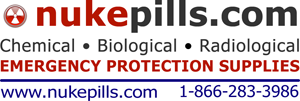American Thyroid Association’s Statement on Potassium Iodide for Nuclear Emergencies
ATA - NOV 7, 2017 - The American Thyroid Association (ATA) has long been an advocate for the use of potassium iodide (KI) as a thyroid blocking agent in the event of a nuclear accident (1). In 2002, the ATA issued a statement on the use of KI in
Read More
Categories:
Press Release

